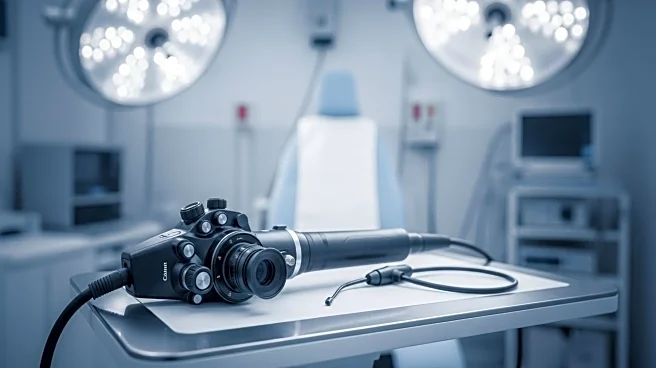What's Happening?
Olympus Canada Inc. has announced the launch of its EZ1500 series endoscopes, featuring Extended Depth of Field (EDOF) technology, as part of the EVIS X1 endoscopy system. This new technology aims to improve
visibility and reduce blurring during gastrointestinal endoscopy procedures. The EZ1500 series allows for closer inspection of the mucosal lining of the GI tract, aiding in the detection of lesions. The launch coincides with the 36th annual Therapeutic Endoscopy Course in Toronto, where the technology will be showcased. The EVIS X1 system includes other advanced features such as TXI, RDI, and NBI technologies, which enhance image color, visibility of blood vessels, and mucosal patterns.
Why It's Important?
The introduction of the EZ1500 series endoscopes represents a significant advancement in medical technology for gastrointestinal procedures. By providing sharper images and improved detection capabilities, this technology can potentially lead to earlier diagnosis and treatment of GI disorders. This is crucial for healthcare providers aiming to improve patient outcomes and reduce the burden of gastrointestinal diseases. The enhanced imaging capabilities may also streamline procedures, making them more efficient and less invasive, which could benefit both patients and healthcare systems by reducing costs and improving care quality.
What's Next?
The launch of the EZ1500 series endoscopes is expected to influence the practices of healthcare providers in Canada and potentially beyond. As the technology is integrated into clinical settings, it may prompt further innovations in endoscopic procedures and training. Healthcare professionals attending the Therapeutic Endoscopy Course will have the opportunity to experience the technology firsthand, which could lead to broader adoption and further advancements in endoscopic techniques. Olympus Canada may continue to develop and refine its technologies to maintain its leadership in the field.
Beyond the Headlines
The deployment of advanced imaging technologies like EDOF in endoscopy could have long-term implications for medical education and training. As these technologies become standard, they may change the skill sets required for endoscopists, emphasizing the need for ongoing education and adaptation to new tools. Additionally, the focus on improving detection and diagnosis aligns with broader healthcare trends towards precision medicine and personalized treatment plans, potentially influencing future research and development in the field.










